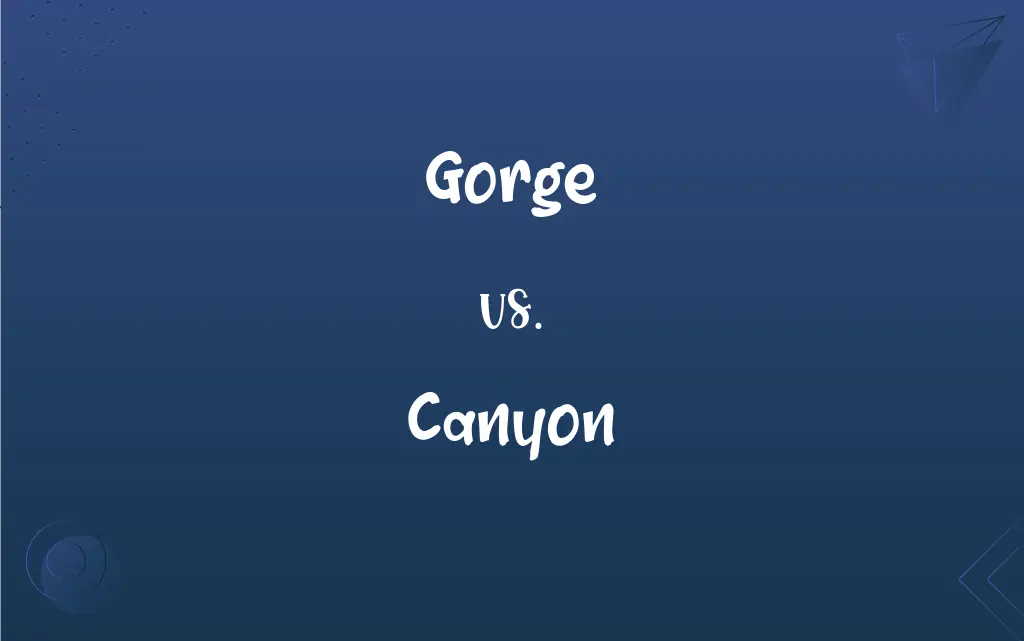Gorge vs. Canyon: What's the Difference?
Edited by Aimie Carlson || By Harlon Moss || Published on December 4, 2023
A gorge is a narrow, steep-sided valley, often with a river, while a canyon is a wider, deep valley with steep sides, typically larger and more expansive.

Key Differences
A gorge is typically narrower and more enclosed than a canyon, often formed by a river cutting through hard rock. Canyons, on the other hand, are wider and more open, commonly formed in areas with layers of soft rock eroded over time.
Gorges are characterized by their steep and often vertical walls, with a river or stream usually flowing at the bottom. Canyons also have steep walls but are generally broader and can encompass a wider range of geological features, including plateaus and river terraces.
The formation of a gorge is often attributed to the erosive action of a river over a long period, especially in mountainous regions. Canyons, conversely, can be formed by a combination of river erosion, weathering, and tectonic activity, typically in arid or semi-arid climates.
Gorges are usually smaller and more constrained in terms of length and width compared to canyons. Canyons, such as the Grand Canyon, are renowned for their vast size, encompassing large areas with diverse landscapes.
In terms of ecological diversity, gorges often support a unique microclimate and can be home to distinct flora and fauna, sheltered by their steep walls. Canyons, with their varying elevations and broader expanse, can host a wider range of ecosystems and habitats.
ADVERTISEMENT
Comparison Chart
Width and Enclosure
Narrower and more enclosed
Wider and more open
Geological Formation
Primarily by river erosion through hard rock
Formed by river erosion, weathering, and tectonic activity in soft rock
Wall Characteristics
Steep and often vertical
Steep but broader with diverse features
Size
Generally smaller in length and width
Larger, encompassing extensive areas
Ecological Diversity
Supports unique microclimate and specific species
Hosts diverse ecosystems due to varying elevations
ADVERTISEMENT
Gorge and Canyon Definitions
Gorge
A gorge is a smaller, more enclosed type of canyon.
The gorge was a perfect spot for experienced rock climbers.
Canyon
A canyon is a large, deep valley with steep sides, often with a river flowing through it.
The Grand Canyon, carved by the Colorado River, is one of the world's most famous canyons.
Gorge
It refers to a deep ravine formed by river erosion.
The hikers descended into the gorge to admire its natural beauty.
Canyon
Canyons often encompass diverse ecosystems due to their size.
The canyon's varied elevations supported a wide range of plant and animal life.
Gorge
A gorge is a narrow valley with steep, rocky walls, and often a river running through it.
The river cut through the landscape, creating a stunning gorge over millennia.
Canyon
A canyon is typically formed in arid or semi-arid regions.
The desert canyon was a testament to the erosive power of water over time.
Gorge
A gorge typically has a river flowing at its base.
The ancient gorge was home to a swiftly flowing mountain stream.
Canyon
It is known for its significant size and diverse geological features.
The canyon's layers of rock told a story of millions of years of geological history.
Gorge
It is often characterized by its dramatic and rugged terrain.
The gorge's steep walls were awe-inspiring to all who visited.
Canyon
It refers to a vast, open ravine, larger than a gorge.
The canyon stretched for miles, its vastness visible from the plateau above.
Gorge
A deep narrow valley with steep rocky sides; a ravine.
Canyon
A narrow chasm with steep cliff walls, cut into the earth by running water; a gorge.
Gorge
A narrow entrance into the outwork of a fortification.
Canyon
A valley, especially a long, narrow, steep valley, cut in rock by a river.
Canyon
The English form of the Spanish word Cañon.
Canyon
A ravine formed by a river in an area with little rainfall
FAQs
Are gorges wider than canyons?
No, gorges are narrower and more enclosed than canyons.
What is a canyon?
A large, deep valley with steep sides, typically larger than a gorge.
What causes canyons to form?
By river erosion, weathering, and tectonic activity, often in soft rock areas.
Do gorges have diverse ecosystems?
Yes, they support unique microclimates and specific species.
What defines a gorge?
A narrow, steep-sided valley often with a river running through it.
In what climates are canyons usually found?
Mainly in arid or semi-arid regions.
Are gorges easy to navigate?
They can be challenging due to their steep and rugged terrain.
Can both gorges and canyons have rivers?
Yes, both can have rivers flowing through them.
How are gorges formed?
Mostly by river erosion through hard rock.
What geological features are common in canyons?
Layers of rock, plateaus, and diverse landforms.
How do canyons differ from gorges in size?
Canyons are generally larger and cover more extensive areas.
What type of climate do gorges typically form in?
Often in mountainous or rugged terrains.
What about the ecological diversity in canyons?
They host diverse ecosystems due to their size and varying elevations.
Is river erosion the only way gorges form?
Primarily, though other geological processes can contribute.
Do canyons always have steep sides?
Typically, yes, they have steep and often expansive sides.
How do canyons affect local climate?
Their size and shape can create unique microclimates within their region.
Are gorges found only in mountains?
Mostly, but they can also form in other types of landscapes.
Are gorges considered a type of canyon?
Yes, they are often viewed as smaller, more enclosed types of canyons.
Can canyons form in areas with abundant rainfall?
They are more common in arid regions but can form in varied climates.
Do both gorges and canyons attract tourists?
Yes, both are popular for their unique natural beauty and outdoor activities.
About Author
Written by
Harlon MossHarlon is a seasoned quality moderator and accomplished content writer for Difference Wiki. An alumnus of the prestigious University of California, he earned his degree in Computer Science. Leveraging his academic background, Harlon brings a meticulous and informed perspective to his work, ensuring content accuracy and excellence.
Edited by
Aimie CarlsonAimie Carlson, holding a master's degree in English literature, is a fervent English language enthusiast. She lends her writing talents to Difference Wiki, a prominent website that specializes in comparisons, offering readers insightful analyses that both captivate and inform.































































